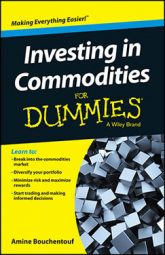Essentially, two types of folks trade futures contracts. The first are commercial producers and consumers of commodities who use the futures markets to stabilize either their costs (in the case of consumers) or their revenues (in the case of producers). The second group consists of individual traders, investment banks, and other financial institutions who are interested in using the futures markets as a way of generating trading profits.
Both groups take advantage of the futures markets' liquidity and leverage to implement their trading strategies.
If you ever get involved in the futures markets, it's important to know who you're up against. I examine the role of these hedgers and speculators in the following sections so you're ready to deal with the competition.
Getting over the hedge
Hedgers are the actual producers and consumers of commodities. Both producers and consumers enter the futures markets with the aim of reducing price volatility in the commodities they buy or sell. Hedging gives these commercial enterprises the opportunity to reduce the risk associated with daily price fluctuations by establishing fixed prices of primary commodities for months, sometimes even years, in advance.
Hedgers can be on either side of a transaction in the futures market, the buy side or the sell side. Consider a few examples of entities that use the futures markets for hedging purposes:
Farmers who want to establish steady prices for their products use futures contracts to sell their products to consumers at a fixed price for a fixed period of time, thus guaranteeing a fixed stream of revenues.
Electric utility companies that supply power to residential customers can buy electricity on the futures markets, to keep their costs fixed and protect their bottom line.
Transportation companies whose business depends on the price of fuel get involved in the futures markets to maintain fixed costs of fuel over specific periods of time.
The truth about speculators
For some reason, the term speculator carries some negative connotation, as if speculating is a sinful or immoral act. In reality, speculators play an important and necessary role in the global financial system. In fact, whenever you buy a stock or a bond, you're speculating. When you think prices are going up, you buy. When they're going down, you sell. The process of figuring out where prices are heading and how to profit from this is the essence of speculation.
In the futures markets, speculators provide much-needed liquidity that allows the many market players to match their buy and sell orders. Speculators, often simply known as traders, buy and sell futures contracts, options, and other exchange-traded products through an electronic platform or a broker, to profit from price fluctuations. A trader who thinks that the price of crude oil is going up will buy a crude oil futures contract to try to profit from his hunch. This action adds liquidity to the markets, which is valuable because liquidity is a prerequisite for the smooth and efficient functioning of the futures markets.
When markets are liquid, you know that you'll be able to find a buyer or a seller for your contracts. You also know that you'll get a reasonable price because liquidity offers you a large pool of market participants competing for your contracts. Finally, liquidity means that when a number of participants are transacting in the marketplace, prices aren't going to be subject to extremely wild and unpredictable price fluctuations. This doesn't mean that liquidity eliminates volatility, but it certainly helps reduce it.
At the end of the day, having a large number of market participants is positive, and speculators play an important role with the liquidity they add to the futures markets.

